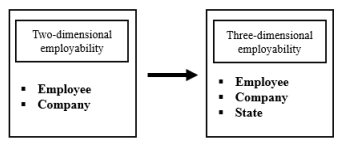From Education to Employment: Developing Soft Skills and Employability.Case of Cadi Ayyad University Career Center

Submission to VIJ 2024-05-29
Keywords
- Career Center; Cadi Ayyad University; Innovation; Pedagogy; Employability.
Copyright (c) 2024 Tayeb Aissaoui, Rachid Ouskou, Ibtissame Lakhlili

This work is licensed under a Creative Commons Attribution 4.0 International License.
Abstract
This work aims to study the role played by university career centers in strengthening the employability of young students, and more specifically the case of the career center of the Cadi Ayyad University of Marrakech. The relevance of this subject stems from the importance of improving employability, but also from the role of public institutions in supporting it in alignment with the concerns of companies. The resolution of this work involves a documentary study of the data developed by the Career Center, and more, a qualitative study of the focus group of the center's advisors.
References
- AMUNDSON, « Développement de carrière. Dimensions de l’employabilité »; 2002.
- BEN HASSEN, HOFAIDHLLAOUI, « l'employabilité des salariés : facteur de la performance des entreprises ? » ; 2012.
- FINOT, « Développer l’employabilité, Insep Consulting Éditions », Paris, 101 p; 2000.
- FUGATE, M. KINICKI, A. J. ET ASHFORTH, B. E. « Employability: A psycho-social construct, its dimensions, and application ». Journal of Vocational Behaviour, 65, 14-38; 2003.
- FUGATE, M. ET ASHFORTH, B.E. « Employability: the construct, its dimensions and applications », Academy of management, best conference paper; 2003.
- FUGATE, M. KINICKI, A.J. PRUSSIA, G.E. « Employee coping with organizational change: an examination of alternative theoretical Perspectives and models, Personnel Psychology », n°61, 1-36; 2008.
- FUGATE, M. KINICKI A. ASHFORTH B. « Employability: A psychosocial construct, its dimensions, and applications », Journal of Vocational Behavior, vol.65, pp. 14-3; 2003.
- FUGATE, M. KINICKI A.J. ASHFORTH, B. « Employability: A psycho-social construct, its dimensions, and applications », Journal of Vocational Behaviour, vol 65, n°1, août, 14-38; 2004.
- FUGATE, M. KINICKI, A. « A dispositional approach to employability: Development of a measure and test of implications for employee reactions to organizational change », Journal of Occupational and Organizational Psychology, vol.81, pp. 503-527; 2008.
- GAZIER, « employabilité : concepts et politiques », InforMISEP, n° 67/68, pp. 38-51; 1999.
- GAZIER, B. « L’employabilité », Encyclopédie des ressources humaines, J. Allouche (coord.), Vuibert, p. 418-427; 2003.
- GRANOVETTER, M. « Le marché autrement - les réseaux dans l’économie », Desclée de Brouwer; 2000.
- HALLIER, J. « Rhetoric but whose reality? The influence of employability messages on employee mobility tactics and work group identification ». The International Journal of Human Resource Management, 20(4), 846-868; 2009.
- HATEGEKIMANA ET ROGER, « Encourager les salariés à développer leur employabilité : une réponse à des préoccupations stratégiques des entreprises», Actes du XIIIème congrès de l’AGRH, Tome 2 p. 205 à 218; 2002.
- HELENS-HART, R. (2019). « Career Education Discourse: Promoting Student Employability in a University Career Center. Qualitative Research in Education, 8(1), 1–26.
- HILLAGE, J. ET POLLARD, E. « Employability: Developing a Framework for Policy Analysis », Research Report RR85, November 1998. Department for Education and Employment: London. P.2; 1998.
- KRETOVICS, HONAKER, ET KRANING, « Career Centers: Changing Needs Require Changing Paradigms ». Colorado State University Journal of Student Affairs; 1999.
- LAIZE, « un modèle de développement des compétences sociales et relationnelles des jeunes d’aujourd’hui et managers de demain ? », Actes du congrès de l’AGRH, Fribourg, 19-21 septembre; 2007.
- PATERSON, R. « Because sometimes your failure can also teach you certain skills': Lecturer and student perceptions of employability skills at a transnational university ». Qualitative Research in Education, 6(3), 241-271; 2017.
- PIHEL, « « la relation salariale moderne ». La dynamique du don/contre-don à l’épreuve et dans l’impasse » ; 2010.
- SAINT-GERMES, E. « L'employabilité par ses pratiques lors des restructurations avec plan de sauvegarde de l'emploi », 15e Congrès de l’Association francophone de Gestion des Ressources Humaines (AGRH) ; 2006.
- SAINT-GERMES, E. « L'employabilité par ses pratiques lors des restructurations avec plan de sauvegarde de l'emploi », 15e Congrès de l’Association francophone de Gestion des Ressources Humaines (AGRH) ; 2006.
- TREMBLAY (1998), « les pratiques d’employabilité au Saguenay-Lac-Saint-Jean : les enjeux idéologiques d’une nouvelle éthique », mémoire de recherche, Université du Québec à Chicoutimi; 1998.
- VAKARIDIS, DELAYE et MATHEZ DE SENGER, « Vos enfants face aux défis du travail ». Bilan. 13 mai 2015.
- VINSON, REARDON et BERTOCH, « The Current Status of Career Services at Colleges and Universities: Technical Report »; 2011.
- VINSON, REARDON et BERTOCH, « Career services at colleges and universities: A 30-year replication study ». Journal of College Student Development, 55(2), pp. 203-207; 2014.